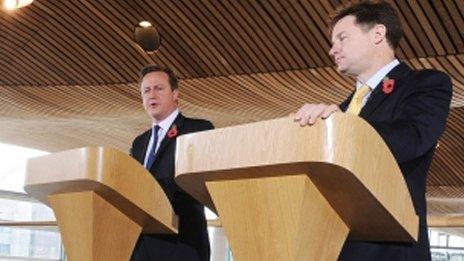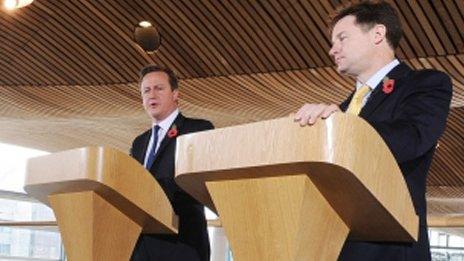Income tax power 'pretty useless' says First Minister
- Published
Carwyn Jones said underfunding of Wales by the UK Treasury had to be addressed first
The income tax powers on offer to the Welsh assembly are "pretty much useless" and would not help the economy, the first minister has said.
Carwyn Jones gives evidence to MPs on Monday on the draft Wales Bill to give the Welsh government the power to vary income tax, subject to a referendum.
In an interview with BBC Wales, Mr Jones criticised restrictions attached.
Welsh Secretary David Jones has said the law will enable the devolved government to support economic growth.
The Wales Bill offers the Welsh government the power to vary income tax after a referendum.
But the UK government has insisted on a "lock-step" system that stops Wales varying tax bands individually.
That means if the Welsh government decided to cut the basic rate by 1p, it would have to cut all other rates of income tax by 1p too.
And if it wanted to raise the top rate by 1p, it would have to raise all other rates by 1p.
"It's a bit like someone giving you a car and saying 'by the way there's only one gear on it'," Mr Jones told Sunday Politics.
"As a way of encouraging the economy to grow it's pretty much useless."
'Rigid model'
In December, Welsh Secretary David Jones said the draft legislation would "enable devolved governance in Wales to become more accountable and better able to support economic growth in Wales".
Labour opposes holding a referendum on income tax unless and until the UK Treasury changes the way it sets the Welsh government's budget, known as the Barnett formula.
The Welsh government says it is short-changed by this calculation to the tune of hundreds of millions of pounds a year.
"Barnett has got to be reformed first, and then if there's going to be an income tax model it's got to be far more flexible than the rigid model that we've been given," Mr Jones added.
"It's not what we wanted. It's not what the Silk Commission recommended either," he said, referring to a report last year from the commission, set up by coalition ministers, which said the Welsh government should have new tax and borrowing powers.

David Cameron and Nick Clegg announced the offer of tax powers in November
The Welsh Affairs Committee visits the National Assembly on Monday to take evidence on the draft bill.
In its evidence to the committee, the Federation of Small Business also criticises the lock-step powers, saying they are unlikely to be used by any administration in Cardiff Bay.
Mr Jones also responded to Wales' slide in the Pisa assessments - the worldwide ranking of education systems - in his interview with the Sunday Politics programme.
He said: "It's a disappointment. You have to accept these things some times. The key is, of course, to improve in the future."
On a failure to hit key targets for the NHS, he said: "I don't buy this idea that somehow the NHS in Wales is failing.
"I don't think that's correct and the vast majority of people in Wales we know have a good experience from the NHS.
"But yes there's always room for improvement."
Sunday Politics Wales is on BBC One Wales at 11:00 GMT on Sunday, 19 January.
- Published18 December 2013

- Published3 December 2013

- Published18 November 2013

- Published3 November 2013

- Published2 November 2013

- Published1 November 2013
